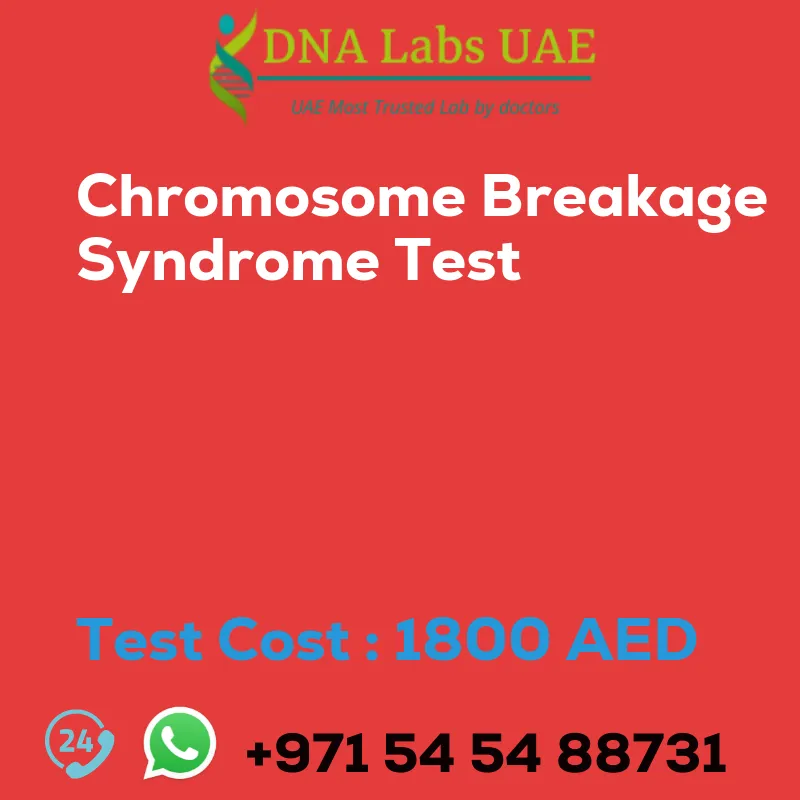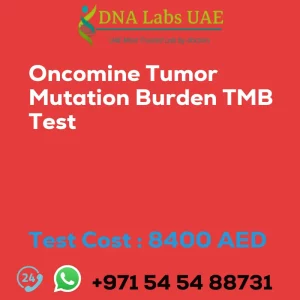Chromosome Breakage Syndrome Test
Test Details
Chromosome breakage syndrome, also known as chromosome instability syndrome, is a rare genetic disorder characterized by the inability of cells to repair DNA damage, resulting in the breakage and rearrangement of chromosomes. This condition is usually caused by mutations in genes involved in DNA repair mechanisms.
Individuals with chromosome breakage syndrome may experience a variety of symptoms, including developmental delays, growth retardation, intellectual disability, and an increased risk of cancer. They may also exhibit physical abnormalities such as facial dysmorphism, microcephaly (abnormally small head), and skeletal abnormalities.
The diagnosis of chromosome breakage syndrome is typically made based on clinical features, genetic testing, and analysis of chromosomes for structural abnormalities. Treatment options for this condition are limited and mainly focus on managing the symptoms and preventing complications. Research is ongoing to better understand the underlying mechanisms of chromosome breakage syndrome and develop potential therapies.
Genetic counseling is also important for affected individuals and their families to understand the inheritance pattern and recurrence risks associated with this condition.
Test Name: Chromosome Breakage Syndrome Test
Components:
- Sodium Heparin Vacutainer
Price: 1800.0 AED
Sample Condition: Peripheral blood (4-5ml)
Report Delivery: 8-10 days
Method: Cell culture
Test type: Genetics
Doctor: Gynecologist
Test Department:
Pre Test Information
Chromosome Breakage Syndrome can be done with a Doctor’s prescription. Prescription is not applicable for surgery and pregnancy cases or people planning to travel abroad.
Test Details
Chromosome breakage syndrome, also known as chromosome instability syndrome, is a rare genetic disorder characterized by the inability of cells to repair DNA damage, resulting in the breakage and rearrangement of chromosomes. This condition is usually caused by mutations in genes involved in DNA repair mechanisms.
Individuals with chromosome breakage syndrome may experience a variety of symptoms, including developmental delays, growth retardation, intellectual disability, and an increased risk of cancer. They may also exhibit physical abnormalities such as facial dysmorphism, microcephaly (abnormally small head), and skeletal abnormalities.
The diagnosis of chromosome breakage syndrome is typically made based on clinical features, genetic testing, and analysis of chromosomes for structural abnormalities. Treatment options for this condition are limited and mainly focus on managing the symptoms and preventing complications. Research is ongoing to better understand the underlying mechanisms of chromosome breakage syndrome and develop potential therapies.
Genetic counseling is also important for affected individuals and their families to understand the inheritance pattern and recurrence risks associated with this condition.
| Test Name | Chromosome Breakage Syndrome Test |
|---|---|
| Components | Sodium Heparin Vacutainer |
| Price | 1800.0 AED |
| Sample Condition | Peripheral blood (4-5ml) |
| Report Delivery | 8-10 days |
| Method | Cell culture |
| Test type | Genetics |
| Doctor | Gynecologist |
| Test Department: | |
| Pre Test Information | Chromosome Breakage Syndrome can be done with a Doctors prescription. Prescription is not applicable for surgery and pregnancy cases or people planing to travel abroad. |
| Test Details |
Chromosome breakage syndrome, also known as chromosome instability syndrome, is a rare genetic disorder characterized by the inability of cells to repair DNA damage, resulting in the breakage and rearrangement of chromosomes. This condition is usually caused by mutations in genes involved in DNA repair mechanisms. Individuals with chromosome breakage syndrome may experience a variety of symptoms, including developmental delays, growth retardation, intellectual disability, and an increased risk of cancer. They may also exhibit physical abnormalities such as facial dysmorphism, microcephaly (abnormally small head), and skeletal abnormalities. The diagnosis of chromosome breakage syndrome is typically made based on clinical features, genetic testing, and analysis of chromosomes for structural abnormalities. Treatment options for this condition are limited and mainly focus on managing the symptoms and preventing complications. Research is ongoing to better understand the underlying mechanisms of chromosome breakage syndrome and develop potential therapies. Genetic counseling is also important for affected individuals and their families to understand the inheritance pattern and recurrence risks associated with this condition. |








